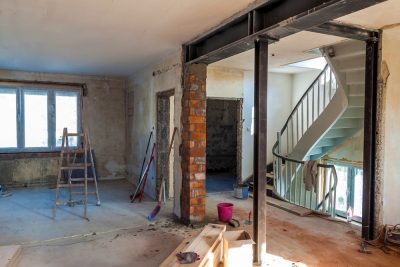
Call Us Today!

Call Us Today!
Renovation taps into considerable possibilities in either function or style, while demolition rips things out for a clean start. Each has its benefits and shortcomings for preservation or outright personalization.
We offer a team to help New Orleans homeowners with this decision, assuring that your investment meets just the right balance of vision and need. Look at both possibilities and find the one that fits. Reach out to us at TurnKey Renovators for a better evaluation.

With so many factors involved, it’s hard to choose between a renovation and demolition. They both have pros and cons, but the considerations include budget, property status, and future perspectives.
The foremost thing to consider is money. Although mostly devastating in nature, large remodels look less expensive in the preliminary stage, and then shocking surprises such as wiring updates often come to figure out. Entering the demolition site demands an awful lot of money first-hand; however, by default, costs are counterbalanced by salvaging.
Immediately after the initial inspection, the construction contractor will look mainly to see if the structure is worth spending money on for renovation. The architectural inconvenience worried measures in updating to a foundation with bad plumbing and electrical works on a price ladder. Structural aspects like sagging roofs make renovation somewhat impractical. Thus, in such cases, unsafe buildings favor demolition more.
Local laws matter. Sometimes zoning will place restrictions on renovation, while obtaining a permit to demolish may take a lot of time. Modification of older homes warrants historic preservation laws, and environmental regulations must be adhered to when demolishing.
Considering your lifestyle and your needs for the future. Renovation ensures an old house retains much of its old-time charm with all modern conveniences, whereas a total rebuild allows you to start from scratch and literally design everything. From a time perspective, consider that renovations generally last a few months, while new builds may be faster yet need more upfront planning.
But that won’t matter much to folks who lay no claim to precedent emotions. Renovations would carry with them some fond memories, while demolition would provide a clean slate to willing souls who are ready to go past and step forward. Weighing sentimental against practical preferences will generally be the right mix for you.

When deciding between renovation and demolition, it’s easy to focus on the upfront price tag—but the hidden costs can tell a very different story. From surprise repairs to long-term maintenance, knowing where your money might really go can help you make a smarter choice.
Renovations often start with a set budget, but hidden problems can push costs way up. Things like rewiring, water damage, or plumbing issues can quickly add an extra $5,000 to $15,000. Older homes sometimes reveal corroded pipes or outdated systems that need replacing, which can really stretch the budget.
Tearing down a house may seem straightforward, but it can also come with surprises. Delays, asbestos removal, or special beam stripping methods can raise costs—sometimes as much as $500 per foot. These add-ons can slow the project and take a bigger bite out of your funds than expected.
Even after a renovation, older homes may keep demanding repairs—like roof leaks, plumbing problems, or HVAC breakdowns. These ongoing fixes might feel small at first, but they add up over time, making the house more expensive to maintain.
Big renovations can easily run over $100,000, while demolition typically falls between $5,000 and $50,000. Building new homes usually costs $150 to $400 per square foot, but they often include energy-efficient systems and require less upkeep. That means fewer headaches and more savings in the long run.
The environment is another important factor to consider. Renovating usually has less impact than building new, since new construction often requires clearing land and using more materials, releasing up to 30% more carbon. In many cases, improving what’s already there is the greener choice.
Demolition often adds to landfill waste, while renovation allows more room for reuse. Repurposing materials like bricks, timber, floors, or doors helps cut down on waste and saves valuable resources.
Many old warehouses, for example, have been transformed into homes—showing that not every building needs to be torn down. This kind of adaptive reuse not only reduces pressure on landfills but also preserves the unique charm of the original structure.
Modern materials keep their promise for durability, but they often do not come cheaply in terms of resources. Renovations can compensate for this by opting for ecological alternatives like reclaimed wood or recycled steel. There are numerous cases where buildings constructed after 1960 are not even conserved, when they could have been spared from demolition. Actively assessing these buildings could benefit our environment.
Renovations are perfect while a good edition of the house is standing for you, and its character is desired. Where repairs are no longer worth the cost, or the layout is not meeting your needs anymore, it is no longer worth engaging. Both roads give options for unique personalization.
We guide you in line with this process that blends artisan workmanship with real solutions to develop timeless spaces. Whether you love the art of retaining and revamping an existing home or prefer a fresh start, we will guide you through making the best choice for your project.
Together, let’s create something timeless. Call us at TurnKey Renovators at once to commence your next chapter at home.

